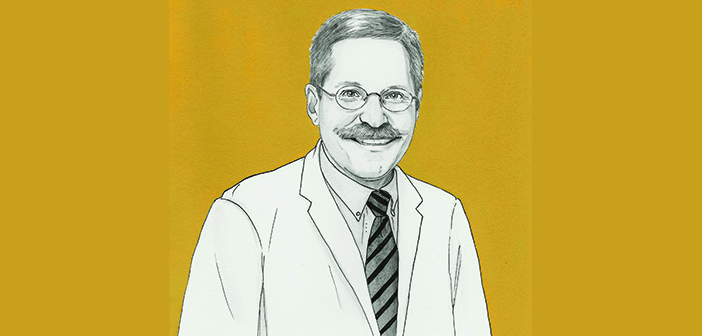Ask the Expert: Leonard Mermel
Ever since the highly pathogenic avian influenza H5N1 first emerged in 1996, it’s “haunted” infectious diseases expert Leonard Mermel, DO, ScM, he says. As it spread from birds to mammals, including humans—and killed about half of the people who contracted it—he couldn’t help but think of the 1918 flu. “Humanity may well be on the brink of the next great pandemic and we are scantily clad to protect ourselves from a virus that will surely thin the herd,” he wrote in The Lancet in 2005. Two decades later, Mermel, a professor of medicine (and a drummer), is still beating the same drum. “I’m either Chicken Little or Paul Revere,” he says. “I hope the former, but if the latter, I want to get the word out.”
The current outbreak, which began in 2021, is infecting more and more mammals. It’s killed big cats in zoos, elephant seals in South America, farmed mink, pet cats, and many others. It’s infecting cows and spreading to farm workers. So, it’s undergone genetic changes that have allowed it to adapt to live in a mammal. We’ve had a few human cases where the CDC did a deep investigation and didn’t find the source—no exposure to farm animals, didn’t have backyard birds, didn’t drink raw milk. Well, where did they get it? We don’t know. Based on a dramatic reduction in funding and personnel in public health at the federal and state level, there may be reduced case finding and underreporting, making it more difficult to determine if this virus is spreading in communities around the US.
For bird flu to fully adapt and then spread person to person, there has to be a genetic change where it preferentially binds to human airway cell receptors. There was a Science article published Dec. 5, 2024, that was somewhat frightening, demonstrating that a single mutation could lead to that. Other changes are needed; it has to survive in and exit the infected human cells. I’m not a virologist, but if that happened, I believe we would certainly have a human pandemic.
As the medical director of the Department of Epidemiology and Infection Control for Brown University Health, I’m very fortunate that our administration is willing to listen to my concerns. We have been meeting weekly as a health care system, addressing various issues regarding pandemic preparedness. Hospitals need to think about, what are their stockpiles of personal protective equipment, stockpiles of antiviral agents? What would be their staffing plans? How would they accommodate an increased volume of patients seeking care as we experienced with COVID?
You don’t want to get the public riled up—I’m sensitive to that. But they need to know what’s really going on and we need to find that equipoise. It’s hard in human nature to plan for the worst-case scenarios. But they’re possible, and that’s the problem with our just-in-time mentality, particularly in the US. I think we’re on the precipice. But have we learned the lessons of COVID?




